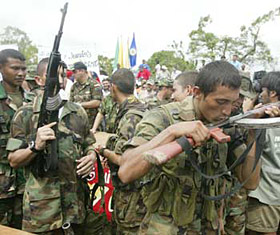 |
 |
 |
 News from Around the Americas | August 2005 News from Around the Americas | August 2005  
Americans Recruiting Colombian Mercenaries for Iraq
 Pascale Mariani & Roméo Langlois - Le Figaro Pascale Mariani & Roméo Langlois - Le Figaro


| | A Colombian paramilitary of the United Self-Defense Forces of Colombia kisses his weapon (R) before turning it over to authorities, during a demobilization in Turbo, Antioquia province, November 25, 2004. (Photo: Reuters) |
Swashbuckling, broken-in to anti-guerrilla fighting, less expensive than their American peers ... On an international mercenary market in full bloom, Colombians are more and more sought-after. Hence this bizarre ad posted by a certain Jeffrey Shippy on the Internet site iraqijobcenter.com.

This American citizen based in Manta, Ecuador, offers the private military companies operating in Iraq the services of "over a thousand Colombian combat-trained ex-soldiers and policemen." Men "trained by the US Navy and the DEA to conduct anti-drug and anti-terrorist operations in the jungles of Colombia" and "ready to work for $2,500 to 5,000 a month," detailed Jeffrey Shippy, who also promises his potential clients "considerable savings for a high quality product."

In Ecuador, the affair has made a big splash. The little Andean country was already worried about anti-guerrilla offensives on its soil orchestrated by Washington in neighboring Colombia. The unpopular American base in Manta was just barely tolerated by the government of the new president, Alfredo Palacio. Quito immediately condemned this recruitment of Colombian mercenaries via Manta. An investigation was opened and Shippy's villa searched. But this former employee of DynCorp, a private aviation company with a steamy reputation, charged in Colombia with spraying coca fields with herbicide, cannot be located.

The Colombians were not unaware that some of their compatriots, war or security professionals, have been having a go at the Iraqi adventure through Pentagon sub-contractors. A parallel army of over 20,000 mercenaries of all nationalities gravitates around coalition forces in Iraq. "It was an unbelievable experience, and I intend to go back to working abroad," enthuses Diego Martinez. This former Colombian Navy non-commissioned officer has worked for a year in Iraq for a British military company, alongside about thirty other Colombians. Recruited in his country through the intermediary of a multinational oil company, he contests being characterized as "a lawless, faithless mercenary."

"In Baghdad, I escorted important people between the airport and the Green Zone. I realized that we were extremely competent at security," Diego relates. "It's been twenty years now that our country has been prey to constant violence. I met a lot of foreigners in Iraq, veritable Rambos provided with highly sophisticated weaponry. But most of them had never participated in combat. Now that kind of experience is so normal for former Colombian military that some don't even mention it on their CV."

The number of these travel candidates is unknown, but the recruitment of Colombians by the Pentagon's private contractors is far from an isolated phenomenon. At the end of 2004, the daily El Tiempo revealed that at the conclusion of a secret meeting with representatives from the American multinational Halliburton, a group of Colombians left for Baghdad, Mosul, Fallujah, and Basra. Their mission: "to protect oil pipelines and private company personnel." Their pay: $7,000 dollars a month, plus a good life insurance policy. A windfall in a country where two thirds of the population lives in poverty.

Blackwater, an American firm specialized in urban warfare, has trained at least 120 Colombians in a military school in Bogotá, with permission from the authorities. The modalities of recruitment are unknown. Blackwater has already been criticized for having sent Pinochet-era Chilean former military to Iraq. In Colombia, some fear that with the ongoing demobilization of death squads, an abundant workforce of unemployed torturers is being recycled through the Iraqi deserts.

"In Iraq," Diego continues, "I met compatriots hired by Blackwater. They were paid $2,500 a month for high risk operations. When they learned I was being paid three times as much, they took it badly." In fact, the tendency is towards a reduction in salaries. "There's a huge competition, especially from Nepalese, less expensive, but much more professional," growls Diego. | 
 | |
 |



